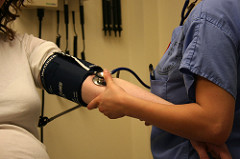
In 2009, NHS England introduced a Directed Enhanced Services (DES) scheme in primary care for adults with learning disabilities. The DES included allocating extra funding to GP practices to provide annual health checks for adults with learning disabilities.
Research has shown that annual health checks can be effective in identifying undiagnosed health problems, improving uptake of preventative care (e.g. cancer screening), and enhancing the provision of care. In 2011/12, about half of all eligible adults with learning disabilities received an annual health check.
This paper describes a research study which set out to provide evidence about whether annual health checks have any impact on the rate of hospitalisation of people with learning disabilities.

In 2011/12, about half of all eligible adults with learning disabilities missed out on their important annual health checks.
Methods
The researchers analysed data from the Clinical Practice Research Datalink (CPRD), a large primary care database representative of the UK population. They included data from 343 GP practices, which were divided into three categories:
- Those in which more than 50% of adults with learning disabilities had received a health check between 2009 and 2010: so called ‘full practice participation’ GP practices
- Those in which fewer than 25% of adults with learning disabilities had received a health check between 2009 and 2010: so called ‘non-participating’ GP practices
- Those having participation rates of between 25% – 50%.
Comparisons were made between ‘full practice participation’ GP practices (n = 126) and ‘non-participating’ GP practices (n = 68).
People with learning disabilities were identified by codes indicating that the person had either a learning disability, or a condition usually associated with learning disabilities (e.g. Down’s syndrome). Data was analysed separately for those requiring high levels of support, and for those that appeared to have lived in a communal setting.
Up to seven controls (people without learning disabilities) were matched to each individual participant according to age, sex, and GP practice.
In total, 7,487 adults with learning disabilities (aged 18-84) who had received at least one health check were identified and matched to 46,408 controls. In addition, 6,922 adults with learning disabilities who had not received a health check were identified and matched to 47,662 controls.
The CPRD data was anonymously linked to Hospital Episode Statistics data, which records information about all inpatient stays. Hospital admission rates in 2011-2012 were compared to those in 2009-2010.

Can annual health checks reduce emergency hospital admissions for people with learning difficulties?
Results
The paper presented a number of analyses investigating the correlation between the number of hospital admissions for people with learning disabilities and annual health checks. The key findings were:
Emergency admissions to hospital
There was no significant difference in emergency admissions to hospital for people with learning disabilities between GP practices with high uptake of health checks (full practice participation) and the non-participating practices.
Nor was there any significant difference in emergency admissions to hospital for people with learning disabilities between those who had received an annual health check, and those who had not.
The analysis did suggest a benefit of health checks on all emergency admissions for people with the most complex health needs requiring a high level of support.
Emergency admissions that were potentially preventable
The researchers looked at emergency admissions to hospital that were potentially preventable. These are often called ‘ambulatory care sensitive conditions’ and include illnesses or conditions, such as epilepsy or constipation, which are potentially preventable through good quality healthcare.
There was a significant difference in emergency admissions for ambulatory care sensitive conditions in people with learning disabilities between GP practices with high uptake of health checks (full practice participation) and the non-participating practices. The rate of these emergency admissions was higher in GP practices not participating in annual health checks compared to the full participation GP practices.
There was also a significant difference in emergency admissions for ambulatory care sensitive conditions in people with learning disabilities between those who had received an annual health check, and those who had not. The rate of emergency admissions was higher in people with learning disabilities who had not received a health check compared to those who had.

Annual health checks for people with learning difficulties can reduce hospital admissions for preventable conditions.
Conclusions
- The study suggests that the introduction of annual health checks for people with learning disabilities has not had any impact on the rate of emergency admissions to hospital for adults with learning disabilities
- However, when only potentially preventable emergency admissions were considered, annual health checks did appear to have had some impact
- There was a higher rate of admissions for ambulatory care sensitive conditions in GP practices not participating in the annual health check scheme, and in people with learning disabilities who had not received a health check.
Strengths and limitations
This is the first study to demonstrate the impact of annual health checks on hospital admissions. Reducing emergency hospital admissions is a national priority, and the strength of this study is that it separates out all emergency admissions from ambulatory care sensitive conditions.
There are a number of limitations of the study, however:
- Key amongst these is that the quality or overall content of the annual health checks provided to people with learning disabilities was not assessed, and it is likely that there would be variation both between, and within, GP practices
- A second key limitation is that the GP practices were unmatched, so GP practices in the ‘full practice participation’ group may have been significantly different from those in the ‘non-participating’ group, in terms of their rates of admission of patients to hospital, and the characteristics of their patients with learning disabilities
- Finally, the authors did not conduct any cost-benefit analysis to determine if the cost of hospital admissions was more than the cost of providing annual health checks.

This study points to a positive impact of annual health checks on hospital admissions for preventable conditions.
Summary
This is an interesting paper which demonstrates the positive impact of annual health checks for people with learning disabilities on the rate at which they are admitted to hospital for illnesses or conditions that could have been prevented by good medical care. Reducing hospital admissions is a key priority in the NHS, and this paper contributes important evidence in how we may reduce hospital admissions in people with learning disabilities.
It should be noted that almost half of the ambulatory care sensitive conditions were related to epilepsy, so improving community-based care for people with epilepsy must be a priority.
The findings presented in this paper add more weight to the need to increase the proportion of people with learning disabilities who receive annual health checks. The latest data published by Public Health England suggests that only 44% of eligible people with learning disabilities in England received a health check in 2013/14 (Public Health England Learning Disability Profiles).

This research adds further weight to the argument that all people with learning disabilities should receive an annual health check.
Links
Primary paper
Carey I, Hosking FJ, Harris T, DeWilde S, Beighton C, Shah SM, Cook DG (2016) Do health checks for adults with intellectual disability reduce emergency hospital admissions? Evaluation of a natural experiment. Epidemiol Community Health. [Pubmed abstract]
Other references
Public Health England Learning Disability Profiles.
Northfield J. (2015) Six out of ten GP surgeries are signed up to the Directed Enhanced Scheme in England, but 40% of patients with learning disabilities did not get a health check. The Learning Disabilities Elf, 9 Jan 2015.
